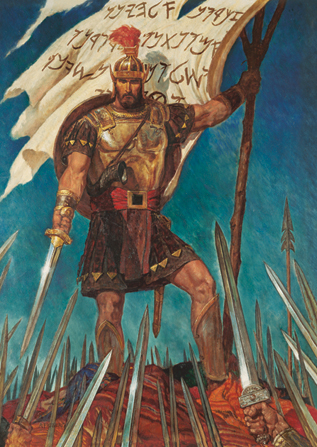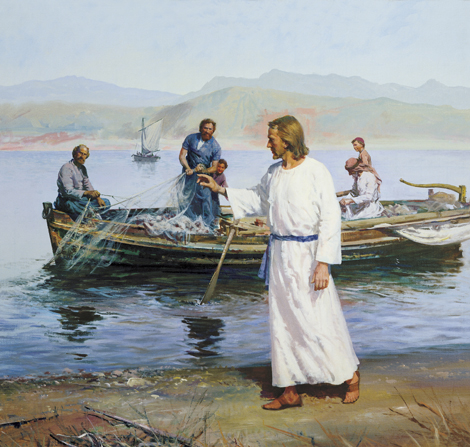This year’s theme for our little town’s Winter Carnival was “Heroes, Myths and Legends.” One of the sculptures is of the wizard Gandalf in the “Lord of the Rings” series. He is a hero, helping other characters to reach deeper inside themselves and do more than they thought they could in the quest to save Middle Earth. “The Lord of the Rings” is one of our family’s favorite movie series, as is “The Chronicles of Narnia.” Both detail the need for heroes and heroic actions in a world that has become overrun by evil. They are a call to remember the faith of their fathers, to stand up for what they believe in and to hope for a better world. Not in absence of evil but in the face of it. Not when things are easy but when things are really hard.
The inspiration from these two series is not just found in the heroic main characters, it is also found in the ordinary people who join in the fight the evil foes. Each person must decide which side to be on, where they fit in the story. This is not so far off from what our children face today. It is no wonder, then, that President Russell M. Nelson has issued a call to faith for members of The Church of Jesus Christ of Latter-day Saints—sometimes mistakenly called the Mormon Church, or Mormons. President Nelson said,
In coming days, it will not be possible to survive spiritually without the guiding, directing, comforting, and constant influence of the Holy Ghost. …
Choose to do the spiritual work required to enjoy the gift of the Holy Ghost and hear the voice of the Spirit more frequently and more clearly.
Why is this so important? And how do we answer the prophet’s call?
What is Faith?
Let’s start by defining faith, and then go backwards. According to Merriam-Webster’s online dictionary, faith is,
- belief and trust in and loyalty to God; belief in the traditional doctrines
of a religion; firm belief in something for which there is no proof; complete trust
- something that is believed especially with strong conviction, especially : a system of religious beliefs
The scriptures teach the same. The Book of Mormon prophet Alma states,
And now as I said concerning faith—faith is not to have a perfect knowledge of things; therefore if ye have faith ye hope for things which are not seen, which are true (Alma 32:21).
But the scriptures teach us that faith is more than just belief. The ancient apostle James taught,
What doth it profit, my brethren, though a man say he hath faith, and have not
works? can faith save him? (James 2:14)
Elder Dieter F. Uchtdorf said,
Faith is a strong conviction about something we believe—a conviction so strong that it moves us to do things that we otherwise might not do. “Faith is being sure of what we hope for and certain of what we do not see.”
Faith is not a mere profession of belief in a greater power and a greater cause, it spurs us to act. So what does this have to do with Gandalf, J.R.R. Tolkien, C.S. Lewis and the other characters in their books? Let’s find out.
A Time of Chaos, A Loss of Faith
We live in a time of chaos and upheaval, and many people are losing faith in mankind as well as in God. The authors of “The Lord of the Rings” and “The Chronicles of Narnia” series lived in a similar time. They lived through the horror and carnage of World War I and the devastating Spanish influenza epidemic of 1918. Of this time, Elder Larry Y. Wilson said,
To many of those living at that time, the cosmos seemed to be indifferent and uncaring. Many of the old celebrated values such as honor, sacrifice, and patriotism seemed hollow. The realities of the new type of war were staggering. The horror of seeing men blown apart and then seeing and smelling their corpses rot for weeks in the cold mud of the trenches tried the faith that had sent men to fight for king, for country, and for God.
As a result, the postwar decades of the 1920s and ’30s were decades of disillusionment and cynicism. Faith in God was questioned widely and openly.
Similar feelings of doubt plague our day. President Nelson taught,
These are the latter days, so none of us should be surprised when we see prophecy fulfilled. A host of prophets, including Isaiah, Paul, Nephi, and Mormon, foresaw that perilous times would come, that in our day the whole world would be in commotion, that men would “be lovers of their own selves, … without natural affection, … lovers of pleasures more than lovers of God,” and that many would become servants of Satan who uphold the adversary’s work. …
As conflicts between nations escalate, as cowardly terrorists prey on the innocent, and as corruption in everything from business to government becomes increasingly commonplace, what can help us?
A Call to Faith
The feelings of despair and doubt that tried the faith of men after the first World War—which was to be the war to end all wars—and the deadly flu epidemic of 1918 were magnified after another world conflict, World War II. Elder Wilson said,
Not long after it ended, two works of literature appeared that went remarkably against the tide of despair. They were The Chronicles of Narnia, by C. S. Lewis, and the trilogy of The Lord of the Rings, by J. R. R. Tolkien. These two men had both been soldiers in World War I and had seen its death and horrors up close. Both men had lost many of their closest friends to the war, but, remarkably, neither succumbed to the cynicism and atheism that was so often the war’s aftermath. Their stories celebrate courage, honor, brotherhood, and faith—especially faith.
What might we learn from these men as we also face a time when faith is ebbing from the world? Following the war, Lewis and Tolkien went on to become university professors. They taught a generation of students struggling to make sense of the world at a time when faith was openly questioned. These two men, who by that time had become fast friends, had an answer. Having come through this period with their own faith intact, they had a message for the next generation. The horrors of war had not manifested to them that faith in God had failed but rather that faith must be viewed in its proper setting. That proper setting was the fallen world in which those who have the precious gift of faith must fight for good against the combined forces of an enemy bent on their destruction.
Turning to ‘Other Gods’
In the time of Tolkien and Lewis, many wondered where God was in all of the horror and death of the wars and plagues. In our time, many have decided that God and religion are antiquated ideas that have no place in our society—or at least should not play a main role. In both cases, many turned to “other gods.” Elder Wilson said,
Some contemporaries criticized these two literary calls to faith. They accused Lewis and Tolkien of hearkening after virtues of a world long past. The disillusioned men and women of the postwar generations were turning to other things—newer gods that promised to save mankind where the Christian and Hebrew gods had seemingly failed.
Communism was particularly alluring to the postwar generations. But whatever gains were made by the forced socialization of countries in the name of communism came at a terrible cost in human lives and human dignity. Millions died in purges and famine. In truth, more people died at the hands of communist dictators than died in both world wars.
Other war-weary souls turned to hedonism—the “eat, drink, and be merry” philosophy that characterized the Roaring Twenties. We might lump in with this group the morally chaotic years that followed the so-called “sexual revolution” of the 1960s. But turning to the pleasures of the flesh has produced in our own time unprecedented levels of divorce and family breakdown, as it inevitably will.
These same philosophies plague us in our day. Elder Quentin L. Cook said,
We live in difficult times. There is an increased tendency to “call evil good, and good evil.” A world that emphasizes self-aggrandizement and secularism is cause for great concern.
But Tolkien and Lewis believed that we should look to God for answers, not away from Him.
The Reality of Evil
What Tolkien and Lewis took away from the world events is something that each of us must learn and understand. Elder Wilson taught,
War did not evidence to Lewis and Tolkien that there was no God but that there was a devil. If we do have faith, then we must hold on to that faith in light of the constant struggle that goes on in the world between the light and “the Shadow,” as Tolkien called it. …
Into a world swirling with such alternatives to a seemingly discredited Christianity, C. S. Lewis and J. R. R. Tolkien sent their tales of heroic quests. Both works surprised critics with their popularity. It was as if they had splashed cold water on the faces of their readers, reminding the downhearted that the world had always been a place where good and evil fought for dominance in the human heart.
Understanding that there is evil in this world does not diminish the good in it. Rather, it helps us to understand the fight before us. There are two things we must remember about this adversary. Elder Jeffrey R. Holland explained,
Number one, Satan, or Lucifer, or the father of lies—call him what you will—is real, the very personification of evil. His motives are in every case malicious, and he convulses at the appearance of redeeming light, at the very thought of truth. Number two, he is eternally opposed to the love of God, the Atonement of Jesus Christ, and the work of peace and salvation. He will fight against these whenever and wherever he can. He knows he will be defeated and cast out in the end, but he is determined to take down with him as many others as he possibly can.
Finding a Hero
It is at this point in a story that a hero steps up to battle forces of evil. Elder Wilson said,
This is a fallen world. The scriptures call Satan “the prince of this world.” The works of both Lewis and Tolkien contained satanic figures who sought to cruelly dominate human beings—the White Witch in one case, Sauron in the other. What does mankind need in such a world? We need forces to counter the boundless evil and a hero to lead those forces. One of the attractions of Lewis’ and Tolkien’s works is this theme of our need for such a hero—a Savior, if you will. On their own, all the characters in the stories we identify with come to a point of their own failure. They need someone stronger than they are.
Surely part of the great appeal of The Chronicles of Narnia and The Lord of the Rings trilogy is the longing we discover within ourselves for a champion to fight those battles we cannot fight.
But the heroes of which are spoken are twofold. One is the hero who fights the battles we cannot, who is indeed the Savior of the world. The other is the hero we find within as we take up our own swords and join the fight. But this fight is not fiction. It is the battle of the ages. Elder L. Tom Perry said,
Today we find ourselves in [a] war. This is not a war of armaments. It is a war of thoughts, words, and deeds. It is a war with sin.
It is a war for the souls of men, and it is a war where our faith is paramount.
Looking Forward with Faith
In our quest for the cause of righteousness, we must choose a side. Can we trust that God and the good will win out in the end, even if evil seems to be winning now? Elder Wilson explained,
We can sometimes forget exactly what the great hope of Christianity is. It is not that Jesus Christ will fulfill all of our own natural aspirations for happiness. It is hope in a triumphant future that only God can and will provide. … The triumph comes “at the last day.”
… Each of us faces a choice. We can choose to see ourselves as the Lord’s servants and humbly seek to know what He wants us to be doing with the talents and time He has given us. As such, we can seek to enlarge His kingdom and prepare it for His return. Or we may imagine that the story is all about us. Too many fall into this trap. They forget that they are His servants and begin to imagine that He is theirs. They think erroneously that Christ came to make all their dreams come true. For those in such a trap, prayer becomes like dropping memos on a desk in a heavenly office: “Could you please take care of this as soon as possible?”
But victory cannot be won without the fight. And there is always a cost. But the rewards will always come to those who are faithful. Elder Holland taught,
Some blessings come soon, some come late, and some don’t come until heaven; but for those who embrace the gospel of Jesus Christ, they come.
Finding the Hero Within
Just as Gandalf and the other characters from the “Narnia” and “Lord of the Rings” series had to find their own hero within, so must we. And it’s not always easy. Elder Wilson said,
In the Lewis and Tolkien stories, the good guys are always humble about the lives they find themselves living. They know that they are part of a larger story, and they seek to carry out that part with faithful hearts. Frodo once expressed his wish that he did not have to undertake such a difficult task as was given to him. “So do I,” Gandalf replied, “and so do all who live to see such times. But that is not for them to decide. All we have to decide is what to do with the time that is given us.”
The time we have is now. The time to have courage is now. President Thomas S. Monson taught,
The call for courage comes constantly to each of us. Every day of our lives courage is needed—not just for the momentous events but more often as we make decisions or respond to circumstances around us.
Courage comes in many forms. Wrote the Christian author Charles Swindoll: “Courage is not limited to the battlefield … or bravely catching a thief in your house. The real tests of courage are much quieter. They are inner tests, like remaining faithful when no one’s looking, … like standing alone when you’re misunderstood.” … This inner courage also includes doing the right thing even though we may be afraid, defending our beliefs at the risk of being ridiculed, and maintaining those beliefs even when threatened with a loss of friends or of social status. He who stands steadfastly for that which is right must risk becoming at times disapproved and unpopular.
Answering the Call
Will we answer the call when it comes? Will we be prepared when it does? Those are the questions we must ask ourselves. President Nelson explained,
I am optimistic about the future. It will be filled with opportunities for each of us to progress, contribute, and take the gospel to every corner of the earth. But I am also not naive about the days ahead. We live in a world that is complex and increasingly contentious. The constant availability of social media and a 24-hour news cycle bombard us with relentless messages. If we are to have any hope of sifting through the myriad of voices and the philosophies of men that attack truth, we must learn to receive revelation.
Our Savior and Redeemer, Jesus Christ, will perform some of His mightiest works between now and when He comes again. We will see miraculous indications that God the Father and His Son, Jesus Christ, preside over this Church in majesty and glory. But in coming days, it will not be possible to survive spiritually without the guiding, directing, comforting, and constant influence of the Holy Ghost.
Thus comes the call from President Nelson,
I plead with you to increase your spiritual capacity to receive revelation.
As we seek to answer the call to follow the Savior and join the fight against evil, we will find our place—and the hero within.









